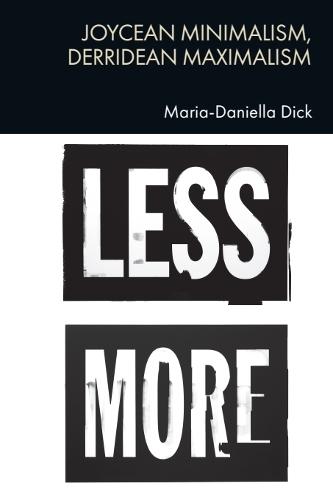Overview
This book presents two major critical reorientations, developing new positions on James Joyce and Jacques Derrida by reading them together within a shared modernity. It places these readings in relation to each other through a conceptual history of maximalism and minimalism, situating literature, philosophy and the history of aesthetics within the context of the closure of metaphysics. Through this revised reading of Joyce, Joycean Minimalism, Derridean Maximalism resituates the reception and periodisation of modernism. It also argues that the configuration of modernism and deconstruction it develops demonstrates a shared austerity one that is located in a mutual philosophical inquiry into self-presence between literature and deconstruction. Overall, Maria-Daniella Dick highlights the contemporaneity of deconstruction in the age of postcritique.
Full Product Details
Author: Maria-Daniella Dick (Senior Lecturer in English Literature, University of Glasgow)
Publisher: Edinburgh University Press
Imprint: Edinburgh University Press
ISBN: 9781474491983
ISBN 10: 1474491987
Pages: 240
Publication Date: 30 September 2025
Audience:
Professional and scholarly
,
Professional & Vocational
Format: Hardback
Publisher's Status: Forthcoming
Availability: Not yet available

This item is yet to be released. You can pre-order this item and we will dispatch it to you upon its release.
Language: English
Reviews
Describing Joyce as a 'Minimalist' and Derrida as a 'Maximalist', Dick's wonderfully astute analysis inverts an alternative that splits modernism (Joyce's maximalism aiming at omnipotence vs. Beckett's minimalism haunted by impotence.) By inserting Derrida's deconstructive machine, she raises the theoretical stakes and proves that modernism can both remobilize philosophy and keep literature flourishing.--Jean-Michel Rabaté, University of Pennsylvania and the American Academy of Arts and Sciences:
Describing Joyce as a ‘Minimalist’ and Derrida as a ‘Maximalist’, Dick’s wonderfully astute analysis inverts an alternative that splits modernism (Joyce’s maximalism aiming at omnipotence vs. Beckett's minimalism haunted by impotence.) By inserting Derrida’s deconstructive machine, she raises the theoretical stakes and proves that modernism can both remobilize philosophy and keep literature flourishing. -- Jean-Michel Rabaté, University of Pennsylvania and the American Academy of Arts and Sciences:
Author Information
Maria-Daniella Dick is a Senior Lecturer in English Literature at the University of Glasgow. Her research interests are in Derrida, Joyce, modern and contemporary literature, and continental philosophy. She has published widely in these areas, on the intersection of international modernism and modernity with continental philosophy and critical theory, and on the comparative and European dimensions of Irish and Scottish culture. She is the co-author of Late Capitalist Freud, with Robbie McLaughlan (2020), and The Derrida Wordbook, with Julian Wolfreys (2013).



